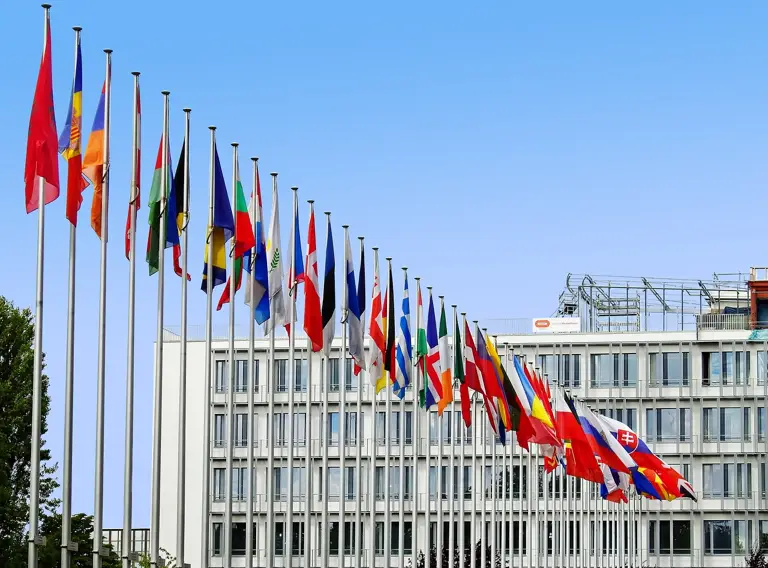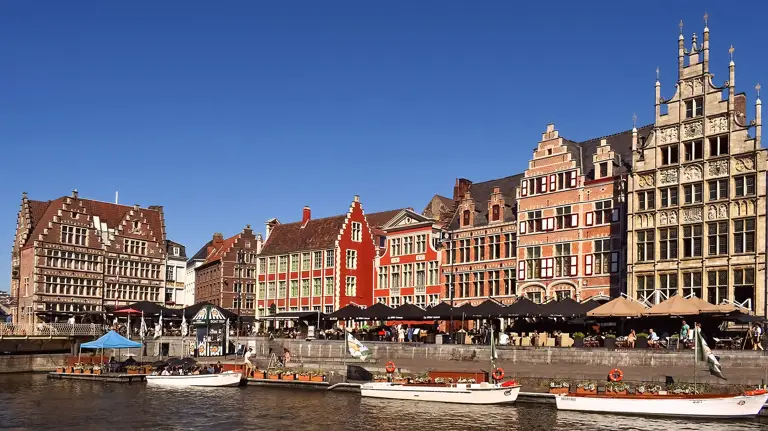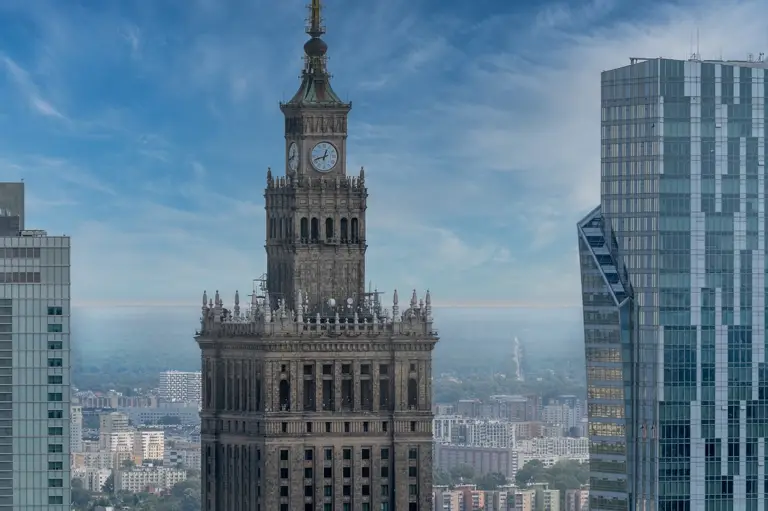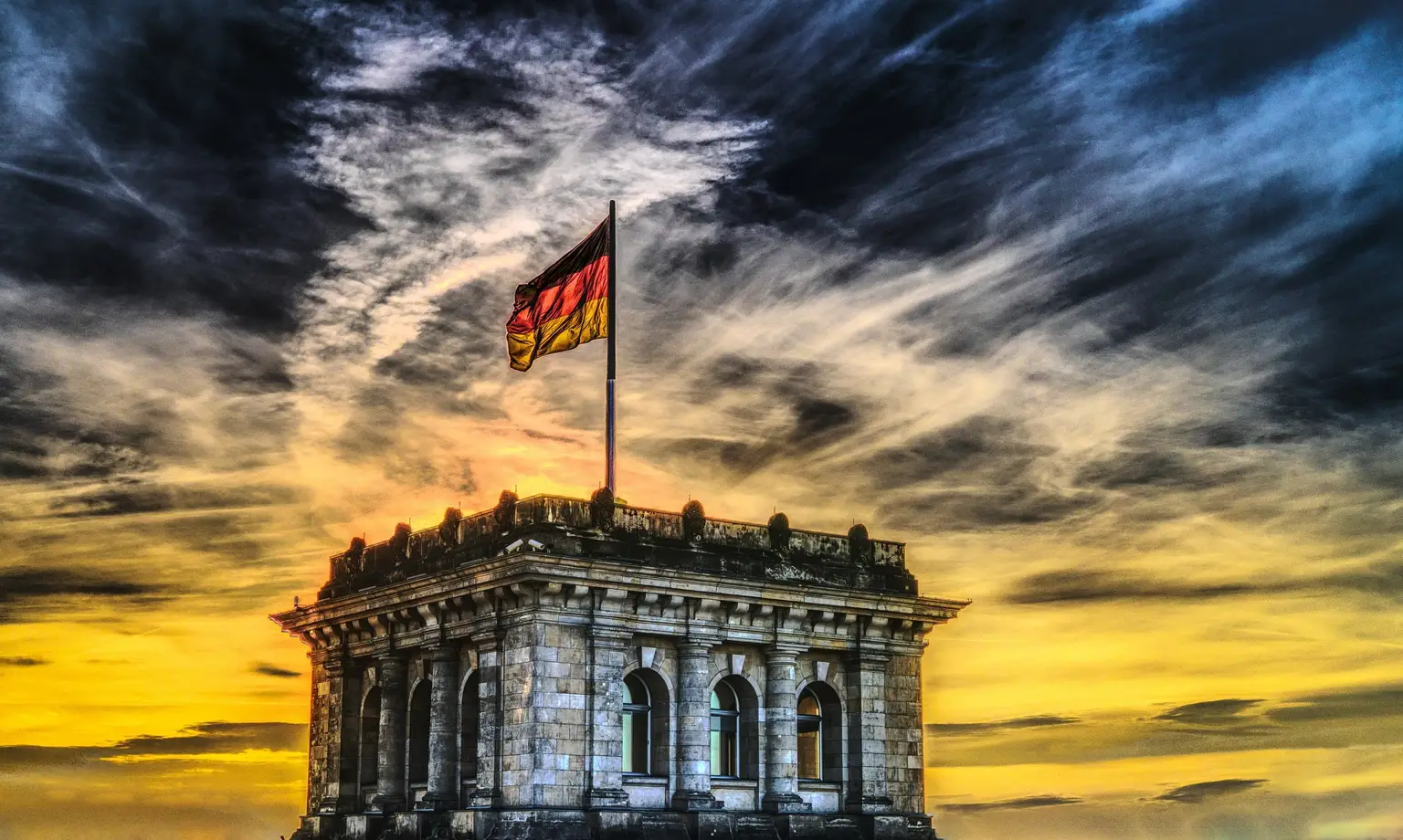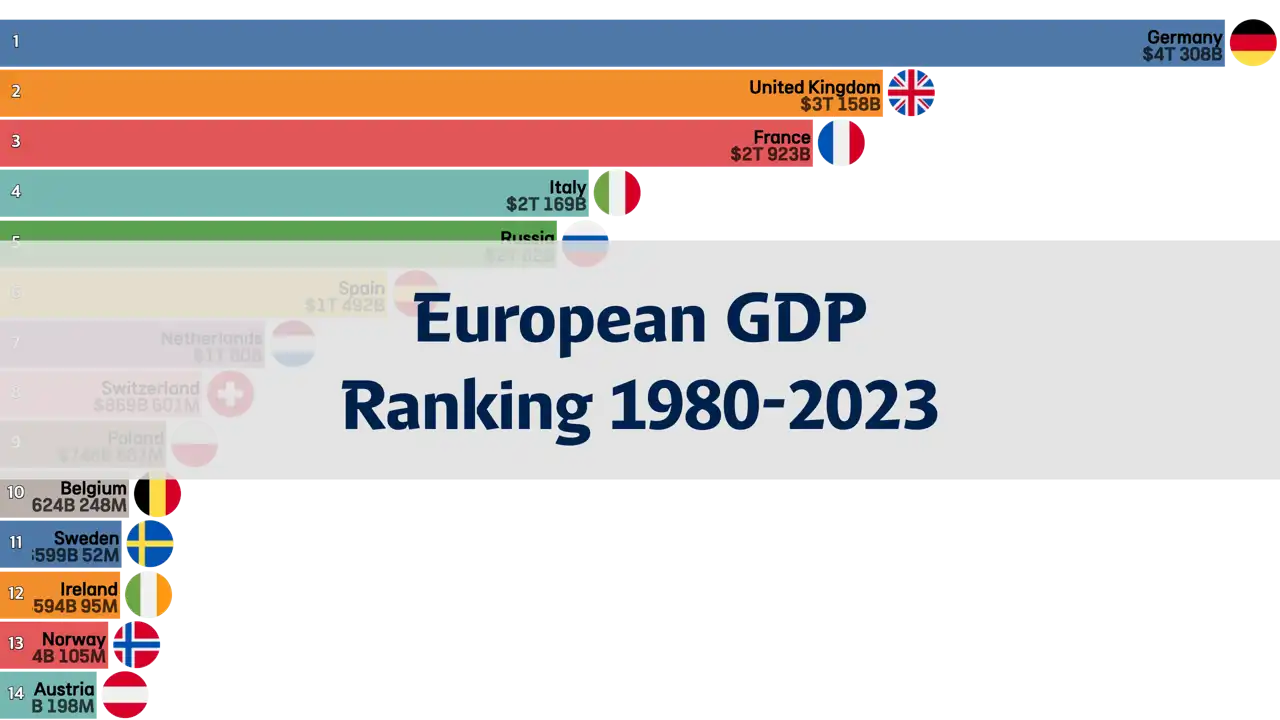
Europe's Top GDP Rankings for 2023: Which Economies Lead the Continent?
- ASUMUP
- National Rankings / Europe
- August 13, 2024
In 2023, Europe showcased its economic might with some of the world's largest and most developed economies. GDP, or Gross Domestic Product, serves as a key indicator of a nation's economic health, reflecting the value of goods and services produced within a country. The economic landscape of Europe is as diverse as its culture, ranging from industrial powerhouses to financial hubs, each contributing to the continent’s overall prosperity.
This post will delve into the top 10 European economies by GDP in 2023, highlighting the key factors that have driven these nations to the forefront of global economic rankings. From Germany's industrial strength to the UK's service-oriented economy, each of these countries has a unique story behind its economic success. We'll explore how these nations compare and what makes them stand out on the European stage.
Understanding these rankings not only provides insights into the economic powerhouses of Europe but also offers a glimpse into the factors that influence global trade, investment, and economic policies. Let's take a closer look at the top GDP performers in Europe for 2023 and what drives their economic engines.
Europe’s GDP Giants of 2023
- 1st Germany - $4.3 trillion
- 2nd United Kingdom - $3.2 trillion
- 3rd France - $2.9 trillion
- 4th Italy - $2.2 trillion
- 5th Russia - $2.1 trillion
- 6th Spain - $1.5 trillion
- 7th Netherlands - $1.1 trillion
- 8th Switzerland - $869 billion
- 9th Poland - $749 billion
- 10th Belgium - $624 billion
10th Belgium - $624 billion
Belgium rounds out the top ten European economies with a GDP of $624 billion in 2023. Belgium's economy is characterized by its strong industrial and service sectors, with key industries including chemicals, pharmaceuticals, and food processing. The country’s strategic location in the heart of Europe and its highly developed infrastructure make it a central hub for trade and commerce.
Belgium is also home to numerous multinational corporations and international organizations, including the European Union and NATO headquarters, which contribute to its economic activity. The country’s economy is supported by a skilled labor force, a high standard of living, and a strong focus on innovation and sustainability. Despite challenges such as regional economic disparities, Belgium remains a vital economic player in Europe, with a well-balanced and resilient economy.
9th Poland - $749 billion
Poland ranks ninth in Europe with a GDP of $749 billion in 2023. Poland’s economy has experienced significant growth over the past few decades, transitioning from a centrally planned economy to a market-oriented one. The country has a diverse economy, with key sectors including manufacturing, services, and agriculture. Poland is also a major player in the European automotive and machinery industries.
The Polish economy is supported by a large domestic market, a highly skilled workforce, and increasing levels of foreign investment. Additionally, Poland benefits from its strategic location in Central Europe, serving as a gateway between Western and Eastern Europe. While the country faces challenges such as regional disparities and infrastructure needs, its ongoing economic reforms and development initiatives continue to drive growth, solidifying its position as a key economy in Europe.
8th Switzerland - $869 billion
Switzerland ranks eighth in Europe with a GDP of $869 billion in 2023. Despite its small size, Switzerland has a highly developed and prosperous economy, known for its strong financial sector, pharmaceuticals, and high-end manufacturing. Swiss banks and financial institutions are globally recognized for their stability and expertise, making Switzerland a major player in international finance.
The Swiss economy also benefits from its world-class education system, high-quality infrastructure, and innovation-driven industries. Additionally, Switzerland is home to numerous multinational corporations and is a leading exporter of luxury goods, precision instruments, and pharmaceuticals. The country’s political stability, strong legal framework, and emphasis on innovation continue to support its economic success, ensuring its place among Europe’s top economies.
7th Netherlands - $1.1 trillion
The Netherlands holds the seventh position in Europe with a GDP of $1.1 trillion in 2023. The Dutch economy is known for its highly developed infrastructure, strategic location, and open trade policies, making it one of the most competitive economies in the world. The country is a major hub for international trade, logistics, and finance, with Rotterdam being one of the busiest ports globally.
The Netherlands also excels in sectors such as agriculture, technology, and energy, with a strong emphasis on innovation and sustainability. Dutch agriculture is particularly advanced, making the Netherlands one of the largest exporters of agricultural products. Despite its relatively small size, the Netherlands punches above its weight in the global economy, driven by its strategic strengths and forward-thinking policies.
6th Spain - $1.5 trillion
Spain stands at sixth place in Europe with a GDP of $1.5 trillion in 2023. The Spanish economy is diverse, with strong contributions from the tourism, manufacturing, and agricultural sectors. Spain is one of the world's leading tourist destinations, with its rich cultural heritage, beautiful landscapes, and vibrant cities attracting millions of visitors each year.
Spain's manufacturing sector, particularly in automotive and aerospace, also plays a crucial role in the economy. Additionally, the country is a major producer of fruits, vegetables, and olive oil, exporting these goods worldwide. While Spain faces economic challenges such as high unemployment and public debt, it continues to be an important economic player in Europe, supported by its diversified economy and strong export sector.
5th Russia - $2.1 trillion
Russia ranks fifth in Europe with a GDP of $2.1 trillion in 2023. Russia’s economy is heavily reliant on its vast natural resources, particularly in oil, gas, and minerals, which play a critical role in its economic structure. These resources make Russia one of the world's leading energy exporters, significantly influencing global energy markets.
The Russian economy also includes substantial industrial and agricultural sectors, with a growing focus on technology and innovation. However, the economy faces challenges, including international sanctions and a need for diversification to reduce dependency on natural resources. Despite these obstacles, Russia maintains a strong economic presence in Europe, driven by its strategic natural assets and large domestic market.
4th Italy - $2.2 trillion
Italy holds the fourth spot in Europe with a GDP of $2.2 trillion in 2023. Italy's economy is renowned for its strong manufacturing base, particularly in industries such as fashion, automotive, and machinery. The country is home to globally recognized brands like Ferrari, Prada, and Fiat, which contribute significantly to its GDP.
Italy’s economy also benefits from its rich cultural heritage, making tourism a vital sector. Additionally, Italy is one of the world's largest producers of high-quality food and wine, further diversifying its economic portfolio. Despite challenges such as political instability and high public debt, Italy's economy continues to demonstrate resilience, supported by a combination of traditional industries and innovation-driven sectors.
3rd France - $2.9 trillion
France secures the third position in Europe’s GDP rankings for 2023, with a GDP of $2.9 trillion. France’s economy is characterized by its diversity, with strong sectors in aerospace, luxury goods, pharmaceuticals, and agriculture. Paris, the capital, is not only a cultural hub but also a major financial center, contributing significantly to the national economy.
France's economic policies emphasize social welfare, public investment, and innovation, supporting a balanced economy that combines industrial strength with a vibrant services sector. The country is also a leading destination for foreign investment, thanks to its strategic location, skilled labor force, and high-quality infrastructure. Despite facing challenges such as high public debt and unemployment rates, France remains a key economic power in Europe, known for its resilience and adaptability.
2nd United Kingdom - $3.2 trillion
The United Kingdom ranks second in Europe with a GDP of $3.2 trillion in 2023. Despite the economic challenges posed by Brexit, the UK has maintained a strong economy, supported by its dominant service sector, which includes finance, insurance, and professional services. London, as one of the world’s leading financial centers, plays a crucial role in the UK's economic landscape, attracting global investment and talent.
The UK's economy also benefits from its advanced technology sector, creative industries, and a highly developed infrastructure. The country's economic policies and regulatory environment are designed to foster innovation and entrepreneurship, making it a competitive player on the global stage. While the UK faces ongoing economic uncertainties, its diverse economy and strategic global relationships continue to underpin its economic strength in Europe.
1st Germany - $4.3 trillion
Germany leads Europe in GDP for 2023, with an impressive figure of $4.3 trillion. As Europe's largest economy and the fourth-largest globally, Germany's economic prowess is built on its robust industrial sector, particularly in automotive, engineering, and manufacturing. The country is home to some of the world's leading companies, including Volkswagen, Siemens, and BMW, which drive its export-oriented economy.
Germany's economic model is characterized by a strong emphasis on innovation, a highly skilled workforce, and a network of small and medium-sized enterprises known as the Mittelstand. These factors, combined with sound fiscal policies and a strong social market economy, have helped Germany maintain its position at the top of Europe’s economic rankings. Despite global challenges, Germany's economy remains resilient, continuing to lead the continent with its technological advancements and high productivity.
Other Posts in the National Rankings / Europe
| Comparing GDP of the United States and Top European Countries in 2023: A Deep Dive into the Economic Powerhouses |
|---|
| Europe's Top GDP Rankings for 2023: Which Economies Lead the Continent? |
Categories
- National Rankings(43)
- Science & Technology(1)
- Sports(24)
- Economy(30)
- Society(12)
- Culture(7)
Recent Posts
![Bayern Spent HOW MUCH on Harry Kane?! Ranking Their Top 10 Biggest Signings Ever]() A deep dive into Bayern Munich's ten most expensive transfers, exploring how the club's spending strategy has evolved to chase European glory.
A deep dive into Bayern Munich's ten most expensive transfers, exploring how the club's spending strategy has evolved to chase European glory.![Arsenal's Record-Shattering Spree: From a €116M Gamble to a Flop, Who Was Worth the Cash?]() A deep dive into Arsenal's top 10 most expensive signings, analyzing the successes, the failures, and the massive fees that have defined the club's modern transfer strategy.
A deep dive into Arsenal's top 10 most expensive signings, analyzing the successes, the failures, and the massive fees that have defined the club's modern transfer strategy.![Chelsea Cashes In BIG TIME! Who Really Won the 25/26 Summer Transfer Window Money Game?]() A deep dive into the top 10 clubs that made the most money from player sales during the wild 25/26 summer transfer window.
A deep dive into the top 10 clubs that made the most money from player sales during the wild 25/26 summer transfer window.![Liverpool's Record-Breaking €483M Spree! Did They Just Buy the Premier League Title?]() A deep dive into the 25/26 summer transfer window reveals Liverpool's record-breaking spending spree as Premier League clubs continue to dominate the market.
A deep dive into the 25/26 summer transfer window reveals Liverpool's record-breaking spending spree as Premier League clubs continue to dominate the market.![You Won't Believe How Much a Loaf of Bread Costs in These Countries! (Spoiler: It's INSANE)]() This post explores the top 10 countries with the most expensive bread, revealing how factors like import reliance and tourism dramatically inflate the cost of this basic staple.
This post explores the top 10 countries with the most expensive bread, revealing how factors like import reliance and tourism dramatically inflate the cost of this basic staple.
